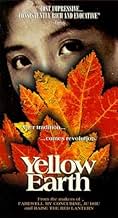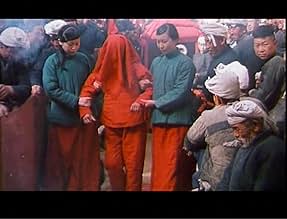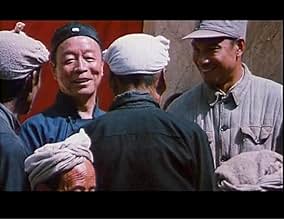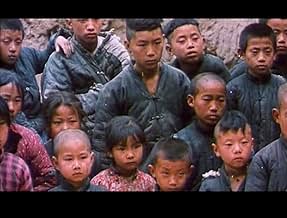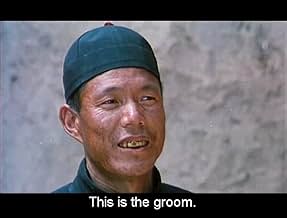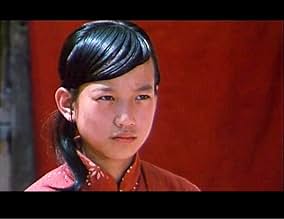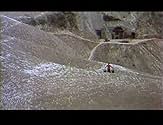CALIFICACIÓN DE IMDb
7.1/10
2.7 k
TU CALIFICACIÓN
Agrega una trama en tu idiomaA communist soldier travels to Shanbei to collect folk songs for propaganda while visiting a poor peasant family, giving hope to the teenage daughter in escaping an arranged marriage.A communist soldier travels to Shanbei to collect folk songs for propaganda while visiting a poor peasant family, giving hope to the teenage daughter in escaping an arranged marriage.A communist soldier travels to Shanbei to collect folk songs for propaganda while visiting a poor peasant family, giving hope to the teenage daughter in escaping an arranged marriage.
- Dirección
- Guionistas
- Elenco
- Premios
- 8 premios ganados y 5 nominaciones en total
- Dirección
- Guionistas
- Todo el elenco y el equipo
- Producción, taquilla y más en IMDbPro
Opiniones destacadas
In this handsome but dramatically subdued portrait of life in the harsh, mountainous hinterland of mainland China a plucky young bureaucrat, collecting folk songs for the communist army, befriends a penniless widower and his children, before learning to his horror that the winsome teenage daughter is to be sold against her will into marriage with an elderly local farmer. Director Kaige Chen shows a photographer's eye for visual composition and symmetry, but the narrative structure of his film is almost non-existent. This is storytelling completely uninfluenced by Western techniques and standards, unfolding for the most part through imagery and song. Whether the result is a refreshing change of pace or an exercise in tedium will depend entire on the viewer's attitude toward classic Third World cinema.
10cameroj
My first viewing of this film was in a freshman seminar here at the University of Michigan aptly called "Chinese Cinema." Immediately after the viewing, my professor left the room and the majority of the class let out a syncronized moan. "I believe that was the worst film we've seen this far," he said. Never could he have been more wrong.
After viewing the film again and taking extensive notes for a paper on the film's earth/ sky imagery, I can say in objectivity that Yellow Earth is a landmark of not only Chinese, but Worldwide cinema. To those who would pay close attention, the film is a piece of art that is inexhaustible in its symbolism and technique. The film's cinematographer, the now very famous director Zhang Yimou, gives each frame its proper condition to the story. Every shot is composed with detail and beauty. The story is inextricably steeped in allegory, each character placed remarkably in relation to the others and to the landscape around them. This composition and the wonderful editing make this film a great cinematic achievement.
The key to the movie's wonder, however, is its ambiguities and its ambivalences. All the editing patterns, the quick cuts and the long stretches, and the masterful composition are strands that are woven as the viewer wills them to be. The ways to interpret everything this movies gives us are endless. Speculation on the film is a task never ending. If you can understand this and cherish the wonder that this film creates through its ambivalence, Yellow Earth is a pleasure with few peers. I recommend that every person interested in Chinese Cinema and classics of all foreign cinema watch this at least once.
After viewing the film again and taking extensive notes for a paper on the film's earth/ sky imagery, I can say in objectivity that Yellow Earth is a landmark of not only Chinese, but Worldwide cinema. To those who would pay close attention, the film is a piece of art that is inexhaustible in its symbolism and technique. The film's cinematographer, the now very famous director Zhang Yimou, gives each frame its proper condition to the story. Every shot is composed with detail and beauty. The story is inextricably steeped in allegory, each character placed remarkably in relation to the others and to the landscape around them. This composition and the wonderful editing make this film a great cinematic achievement.
The key to the movie's wonder, however, is its ambiguities and its ambivalences. All the editing patterns, the quick cuts and the long stretches, and the masterful composition are strands that are woven as the viewer wills them to be. The ways to interpret everything this movies gives us are endless. Speculation on the film is a task never ending. If you can understand this and cherish the wonder that this film creates through its ambivalence, Yellow Earth is a pleasure with few peers. I recommend that every person interested in Chinese Cinema and classics of all foreign cinema watch this at least once.
Ugh, this is a hard movie to watch. It is both boring and depressing -- and yet really good! How crazy that it works out that way. Maybe because it's a little TOO close to the experience of real life. Here we have a film that's a window into the life of Cuiqiao, and her tiny family of peasants, in a north-western province of China during World War II.
The music is a motif and the main thematic element of the film, expressing the misery most eloquently. The plot sees a lowly Communist officer trying to catalog or find folk songs for the Communist foot-soldiers to sing as morale-boosters. The best singer in town is the shy and depressed Cuiqiao whose life is pitiable. I won't go into details, but it is depressing for reasons that are equally social and economic. The officer seems nice, but he seems like another pawn in a bigger power game -- a guy who really isn't so sure of his faith in the party beyond a means of escape. He's just another guy staying one step ahead of the virulent poverty the main characters suffer through.
Seriously, the stuff is really affecting and memorable. The funny scene or two in this movie is all the more smile-inducing because you're just so glad for the break in the bleak atmosphere. And the songs -- mein gott, what grating stuff to spoiled western ears, but simultaneously so gut-wrenching! I'd call this a period piece, but the experiences of rural western villagers in China are probably pretty timeless. I mean, the landscape is certainly changing, but there are a lot of places that are still like this.
Watch it, you spoiled punks!
The music is a motif and the main thematic element of the film, expressing the misery most eloquently. The plot sees a lowly Communist officer trying to catalog or find folk songs for the Communist foot-soldiers to sing as morale-boosters. The best singer in town is the shy and depressed Cuiqiao whose life is pitiable. I won't go into details, but it is depressing for reasons that are equally social and economic. The officer seems nice, but he seems like another pawn in a bigger power game -- a guy who really isn't so sure of his faith in the party beyond a means of escape. He's just another guy staying one step ahead of the virulent poverty the main characters suffer through.
Seriously, the stuff is really affecting and memorable. The funny scene or two in this movie is all the more smile-inducing because you're just so glad for the break in the bleak atmosphere. And the songs -- mein gott, what grating stuff to spoiled western ears, but simultaneously so gut-wrenching! I'd call this a period piece, but the experiences of rural western villagers in China are probably pretty timeless. I mean, the landscape is certainly changing, but there are a lot of places that are still like this.
Watch it, you spoiled punks!
Not far from the yellow river there is a big area where the earth also is yellow and the climate and living are very harsh, this time because of a drought. First we see a wedding ceremony with the bride little more than 12 years old, a happy occasion for everyone except for the skeptical onlooking Cuiqiao whose fate will be similar in short time and the bride herself. Enter folk song collector comrade Gu who stays with her family for some time. His talk of whats going on in the south, the end of arranged weddings and equality of women sets a deep impression on Cuiqiao, but also her mute brother.
Much of the film is told in its folk songs and its pictures. Cuiqiaos misery is told with songs: "of all the people//girls are the most miserable" and her new hope with the songs of the Party.
The pictures leave much room for the environments to sink in. Distances are big and the landscape homogeneous, that is earth covered mountains and a wide yellow river. In a setting such as this, the figures get small, and even more so by the devotion Zhang Yimou gives to the vast sky.
Much of the film is told in its folk songs and its pictures. Cuiqiaos misery is told with songs: "of all the people//girls are the most miserable" and her new hope with the songs of the Party.
The pictures leave much room for the environments to sink in. Distances are big and the landscape homogeneous, that is earth covered mountains and a wide yellow river. In a setting such as this, the figures get small, and even more so by the devotion Zhang Yimou gives to the vast sky.
10zzmale
including the communist ideology.
Great directorial work in describing the harsh conditions that not only resulted from unforgiving nature and political turmoil, but also from the burden of traditional Chinese culture, which is partly to blame for the political turmoils of post-revolution era. The film is one of the pioneers in the re examination of Chinese tradition and although it has not gone into detailed criticism like later films such as Bian Lian (Change Face) of later era, it was a good beginning.
Great directorial work in describing the harsh conditions that not only resulted from unforgiving nature and political turmoil, but also from the burden of traditional Chinese culture, which is partly to blame for the political turmoils of post-revolution era. The film is one of the pioneers in the re examination of Chinese tradition and although it has not gone into detailed criticism like later films such as Bian Lian (Change Face) of later era, it was a good beginning.
¿Sabías que…?
- TriviaThe film was filmed near Yan'An, which is considered the motherland of the Chinese cultural revolution.
- ConexionesFeatured in La historia del cine: Una odisea: Fight the Power: Protest in Film (2011)
Selecciones populares
Inicia sesión para calificar y agrega a la lista de videos para obtener recomendaciones personalizadas
- How long is Yellow Earth?Con tecnología de Alexa
Detalles
Contribuir a esta página
Sugiere una edición o agrega el contenido que falta

